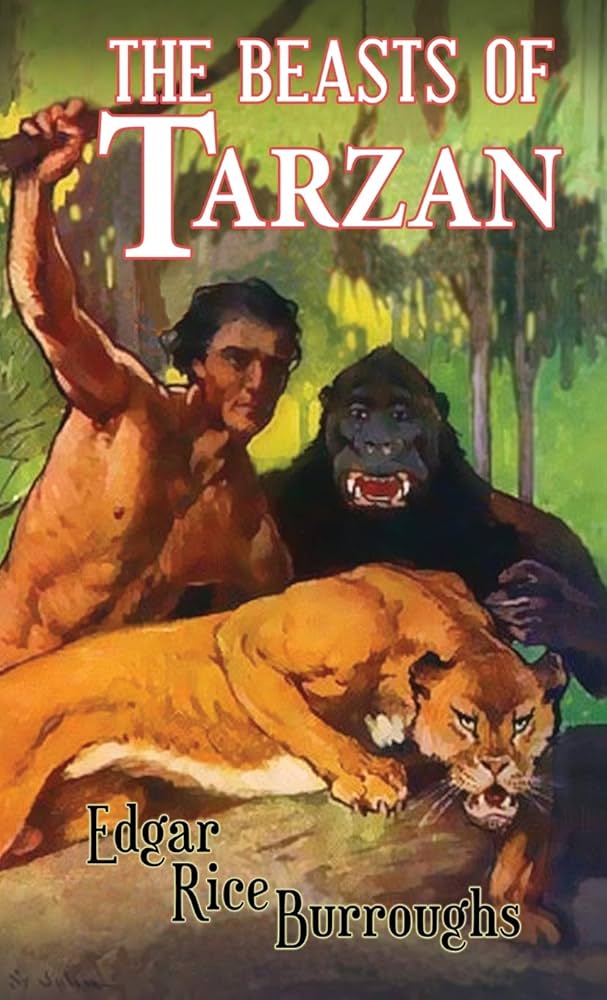Chapter 18 — The beasts of Tarzan
byChapter 18 – The beasts of Tarzan begins with Paulvitch seething in isolation, his hatred for Tarzan festering into a dangerous obsession. Alone and humiliated, he finds his pride wounded more than his body, and that wound festers into a plan fueled not by logic but by malice. Revenge is the only idea that keeps him moving, despite having no allies and little chance of success. He knows he can’t take on Tarzan in a direct fight. Instead, his plan becomes a blend of desperation and madness. He convinces himself that a single, devastating act could settle the score once and for all.
He stumbles through the jungle toward a coastal village, hoping to secure a canoe. The villagers, recognizing Paulvitch from earlier misconduct, reject him violently, leaving him to slink into the shadows. He watches for hours until a young boy approaches the shore alone. Seeing his chance, Paulvitch acts without remorse, killing the child and taking the canoe. It’s a brutal, silent moment, one that reveals how far he has fallen. His cruelty goes unchecked, masked as necessity in his warped mind. With blood on his hands and a stolen vessel beneath him, he rows toward the Kincaid, eager to put his plan into motion.
Arriving under cover of night, Paulvitch boards the ship silently, moving like a rat in the shadows. He approaches a sailor and offers a deal—help him reclaim control, and riches will follow. But the crew, though no saints, want no part in another betrayal. Paulvitch is rebuffed and threatened with being turned over to Tarzan. He pleads, bribes, even begs, but none listen. Rejected again, Paulvitch becomes even more dangerous. He chooses not to run away, but to strike in secret, convinced that he still holds power if he can’t be stopped.
In his quarters, Paulvitch retrieves a deadly invention from his time with anarchist rebels—an infernal machine crafted to destroy. It’s a bomb, small yet lethal, and he arms it with steady hands. His fingers, once clumsy with panic, now move with eerie calm. He hides the device in a place where it will cause the most damage, believing it to be poetic justice. To him, Tarzan will never see it coming. His exit is quiet. He collects what he can and disappears into the dark, carrying with him the illusion of victory. The ship continues to sleep above the ticking threat.
The chapter builds dread with subtle precision. Paulvitch, once only a petty villain, becomes an embodiment of bitter persistence and calculated malice. His actions are not merely evil; they are a reflection of the twisted logic that festers in solitude. Readers witness a man who believes the world owes him ruin in return. The jungle has not reformed him—it has hardened his cruelty. The bomb now aboard the Kincaid represents more than sabotage. It is the last desperate grasp of a man who has nothing left to lose and sees destruction as his only legacy.
Meanwhile, aboard the Kincaid, Tarzan remains unaware of the peril. His mind is set on family, on rescuing what remains of his peace. The animals are restless, the ship carries tension like a storm about to break. Yet amidst the anticipation of reunion, no one suspects that vengeance is already embedded in their path. The ticking bomb is more than a device—it’s a symbol of all that Tarzan’s enemies have failed to destroy by force. Now, they’ve turned to cunning and cowardice. And as the ship sails forward, unaware of the threat lurking below, the question remains whether Tarzan’s strength and instinct will be enough to defuse more than just a bomb—but the consequences of all the enemies he’s left behind.

